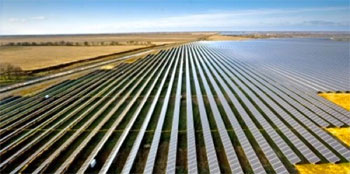While Republicans view the situation in Ukraine as an opportunity for the US to export natural gas, others see it as yet another chance to move to renewable energy.
As Tom Friedman says in a NY Times editorial, he doesn’t want another cold war but if that’s inevitable, instead of a Space Race, he wants an Earth Race. "I want America to lead in developing an energy policy that will weaken the oil-and-gas-autocracy of
Russian President Vladimir Putin, and, as a byproduct, produce the technologies that will mitigate climate change, make America a global technology and moral leader and ensure that the next generation can thrive here on Earth."
Connie Hedegaard, European Commissioner for Climate Action, agrees. Europe, which gets 30% of its natural gas from Russia, should see this as a wake-up call to get off gas for good and switch to renewables.
The EU spent $551 billion in 2012 – 3.1% of GDP – to import oil and gas, leaders say.
She also took the opportunity to push back against the loud voices in Europe that say soaring energy costs are because of subsidies for renewable energy. That’s a myth, she says.
EU leaders are debating these issues in Brussels this week. They want the European Commission to have a plan within three months to diversify from Russia’s gas.
Crimea is home to Europe’s biggest solar farm, the 100 MW Perovo Solar Park:

Crimea’s solar industry is hanging in the air. Ukraine has one of the world’s most generous feed-in tariffs for solar PV – €0.34 per kilowatt hour and of €0.46 euros for utility-scale plants.
"It is unclear what the referendum means for the owners of solar plants or for other investors in Crimea," a spokesperson for Activ Solar told PV Tech. Activ built and operates four utility-scale solar plants in Crimea, including Europe’s largest – the 100 MW Perovo Solar Park.
Meanwhile in the US, the GOP position has been widely taken up by the press from the NY Times to the Washington Post and Wall Street Journal, all endorsing natural gas exports to reduce Russia’s influence.
Of course, from an environmental perspective, that’s a very bad idea. It would open up the US to, as Rep Paul Ryan (R-WI) says, drill absolutely everywhere in every nook and cranny. And don’t forget the Keystone Pipeline – that would be approved too.
Do Americans really understand what they’re getting into in becoming a Petro State? You can be sure the rush to frack everywhere would supercede the need for regulations and would most certainly bring it into peoples’ backyards.
"It’s the most recent convenient opportunity for the oil and gas industry and their front groups to intensify fracking," notes Gabe Wisniewski of Greenpeace. "They had a different argument three months ago for why fracking is the solution to America’s energy issues, and a year ago they had a different reason."
While Republicans are pushing for quick approval of liquefied natural gas (LNG) export terminals across the US, experts say they could never be built fast enough and wouldn’t necessarily be profitable for the gas industry. They take years to build and billions of dollars, and because China pays a third more for gas than Europe, that’s where they would want it shipped to.
As an example, "the proposed Cove Point LNG terminal – against which over 80,000 people currently protested – would certainly make gas companies richer, but rather than strengthening our nation, it would further disrupt our climate," says Michael Brune, executive director of Sierra Club.
In NY, Governor Cuomo is deciding whether to ban or allow fracking. "Wouldn’t it be ironic if the Ukraine crisis dashes the possibility of offshore wind for Long Island and gives Cuomo his excuse to okay fracking, because of new political pressure to build the Port Ambrose LNG port?," asks our news reporter Karen Rubin.
To make Ambrose palatable, it’s being called an "import" port, but since the US is self-sustaining on natural gas, there’s no need to import more, Rubin points out. Because of the long lead time required to build these facilities, turning import ports into export ports would be the fastest way to get gas to Europe.
Learn more about Perovo Solar Park:

Activ Solar was the company controlled by the runaway National Security Council head Mr. Andrey Kluev. This is where such a generous FIT come from. In fact, the struggling Ukrainian economy should’t have to have the biggest solar plant in Europe, it just couldn’t pay off.
Your “reporter” Karen Rubin is not doing news. What she stated about Port Ambrose is incoherent. Port Ambrose has about ten thousand pages or more filed on it as an IMPORT project not an export project.